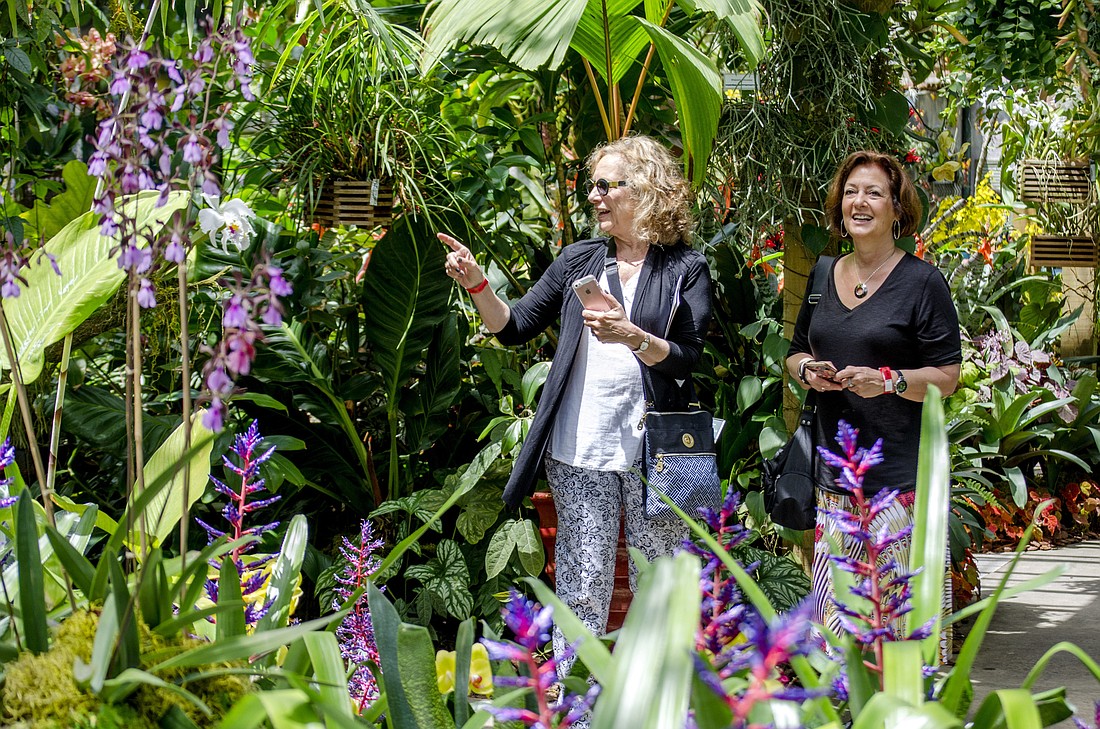- April 11, 2025
-
-
Loading

Loading

The Marie Selby Botanical Gardens conservatory exudes ease.
The building, home to an exhibit depicting Marc Chagall’s French Riviera, is almost ethereal. Flowers and fronds surround visitors at almost every turn while music and the sound of falling water fill the air.
It’s ironic that a place that elicits such calm is the manifestation of a labor-intensive institutional overhaul. The exhibit was introduced in February and is Selby’s most recent in what is now an indefinite cycle of rotating exhibits — a model that is driving new growth.
“This is a major exhibition that we undertook as we repositioned the institution as a living museum,” Selby CEO Jennifer Rominiecki said.
Since the exhibit opened in February, Selby has experienced a 40% increase in admissions over the same period last year — more than 1,000 a day — accounting for a 30% increase in revenue.
“We always want to give them something new and fresh to give them a reason to keep coming back,” Rominiecki said.
The growth has inspired an initiative to renovate the gardens to boost capacity.
“We have been having 1,100 people a day, which is fantastic. However our parking and our orientation facilities are really not equipped,” Rominiecki said. “We’re at maximum capacity.”
When Rominiecki joined Marie Selby Botanical Gardens in February 2015, she saw a garden ripe for change.
“When I started meeting people in the community … they would say ‘Oh, I love Selby Gardens! It’s beautiful!’ But as if they had seen it and didn’t have a reason to come back,” Rominiecki said.
Selby, a Sarasota institution since 1975, had stagnated.
“They just thought it was a park, honestly. That’s what it really was to people,” Selby Board of Trustees Treasurer J. Allison Archbold said.
“The flowers may have been in bloom, but Selby itself really wasn’t in bloom.”
It held the same festivals, held the same music series, yet there was nothing dynamic in its appeal.
Rominiecki planted the seeds for a renaissance with a model adapted from her previous work at the New York Botanical Garden.
The formula was simple. Introduce a rotating schedule of exhibits to encourage continued visitations.
“We have such a perfect location in downtown Sarasota, right on the bayfront. We already had a museum building … So we already had the sort of setup that would be perfect to take this on,” Rominiecki said. “Before I had even accepted the job I knew that this was a really perfect direction for us to go in.”
The Chagall exhibit is comprehensive.
The cafe serves French food, and the garden outside Michael’s on the Bay, what used to be the garden’s great room, evokes thoughts of the French Riviera.
“I think what’s exciting is the program features nature based art and art based nature,” Rominiecki said.
The exhibits create a constant challenge for Selby’s horticulture department.
“Our role was to develop the exhibitry … which was pretty interesting,” Senior Director of Horticulture and Site Operations Mike McLaughlin said, “(Chagall) was a painter, as well as other things, but how do you do that with plants?”
The result is something of masterpiece in and of itself. But it won’t be the last creative hurdle McLaughlin and his team will have to leap as the garden continues to embrace a business model indicative of a museum.
Selby will be bringing back its orchid exhibit this fall under the theme earth, air, fire and water.
“We’re still figuring out what that means,” McLaughlin laughed.
Once they do, McLaughlin and his team will begin building the Andy Warhol exhibit slated for February 2018.
Selby’s challenges are not just creative. With rapid growth in visitation comes the challenge of maximizing efficiency.
“What we have is this plot of land that was never designed to be a public institution,” McLaughlin said. “What that means is there is a lot of inefficiency. This space is not well used and particularly bisecting it by a street is not very helpful.”
The garden is in a master planning phase. Formal site plans are slated to be released later this year. Yet, early projections suggest changes to the parking and administrative facilities could create 50% more garden space and a new visitor welcome center.
But for McLaughlin, the benefits of Selby’s increase in revenue and visitors are not always measurable.
“Gardens are never finished.”
-Mike McLaughlin, Senior Director of Horticulture and Site Operations
“It’s amazing how this community already feels about us — just this real emotional connection,” McLaughlin said. “By doing things like Chagall we just strengthen that.”
Which is good for McLaughlin and the rest of the Selby team. As Rominiecki’s model continues to gain momentum, it’ll mean Selby Gardens will continue to bloom long after the Chagall exhibit closes this July.
But that’s to be expected from an institution with such deep roots.
“Gardens are never finished,” McLaughlin said.